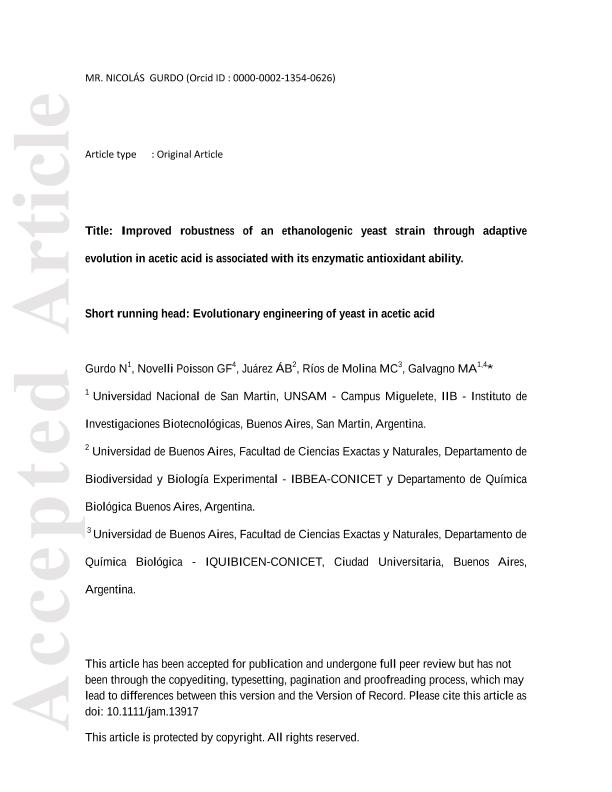Artículo
Improved robustness of an ethanologenic yeast strain through adaptive evolution in acetic acid is associated with its enzymatic antioxidant ability
Gurdo, Nicolás; Novelli Poisson, Guido Fernando; Juárez, Angela Beatriz; Rios, Maria del Carmen ; Galvagno, Miguel Angel
; Galvagno, Miguel Angel
 ; Galvagno, Miguel Angel
; Galvagno, Miguel Angel
Fecha de publicación:
09/2018
Editorial:
Wiley Blackwell Publishing, Inc
Revista:
Journal of Applied Microbiology
ISSN:
1364-5072
Idioma:
Inglés
Tipo de recurso:
Artículo publicado
Clasificación temática:
Resumen
Aims: To investigate multiple tolerance of Saccharomyces cerevisiae obtained through a laboratory strategy of adaptive evolution in acetic acid, its relation with enzymatic ROS detoxification and bioethanol 2G production. Methods and Results: After adaptive evolution in acetic acid, a clone (Y8A) was selected for its tolerance to high acetic acid concentrations (13 g l−1) in batch cultures. Y8A was resistant to multiple stresses: osmotic, thermic, oxidative, saline, ethanol, organic acid, phenolic compounds and slow freeze-thawing cycles. Also, Y8A was able to maintain redox homeostasis under oxidative stress, whereas the isogenic parental strain (Y8) could not, indicating higher basal activity levels of antioxidative enzyme Catalase (CAT) and Gluthatione S-transferase (GST) in Y8A. Y8A reached higher bioethanol levels in a fermentation medium containing up to 8 g l−1 of acetic acid when compared to parental strain Y8. Conclusions: A multiple-stress-tolerant clone was obtained using adaptive evolution in acetic acid. Stress cross-tolerance could be explained by its enzymatic antioxidative capacity, namely CAT and GST. Significance and Impact of the Study: We demonstrate that adaptive evolution used in S. cerevisiae was a useful strategy to obtain a yeast clone tolerant to multiple stresses. At the same time, our findings support the idea that tolerance to oxidative stress is the common basis for stress cotolerance, which is related to an increase in the specific enzymes CAT and GST but not in Superoxide dismutase, emphasizing the fact that detoxification of H2O2 and not O2˙ is a key condition for multiple stress tolerance in S. cerevisiae.
Archivos asociados
Licencia
Identificadores
Colecciones
Articulos(IIB-INTECH)
Articulos de INST.DE INVEST.BIOTECNOLOGICAS - INSTITUTO TECNOLOGICO CHASCOMUS
Articulos de INST.DE INVEST.BIOTECNOLOGICAS - INSTITUTO TECNOLOGICO CHASCOMUS
Articulos(IQUIBICEN)
Articulos de INSTITUTO DE QUIMICA BIOLOGICA DE LA FACULTAD DE CS. EXACTAS Y NATURALES
Articulos de INSTITUTO DE QUIMICA BIOLOGICA DE LA FACULTAD DE CS. EXACTAS Y NATURALES
Citación
Gurdo, Nicolás; Novelli Poisson, Guido Fernando; Juárez, Angela Beatriz; Rios, Maria del Carmen; Galvagno, Miguel Angel; Improved robustness of an ethanologenic yeast strain through adaptive evolution in acetic acid is associated with its enzymatic antioxidant ability; Wiley Blackwell Publishing, Inc; Journal of Applied Microbiology; 125; 3; 9-2018; 766-776
Compartir
Altmétricas



